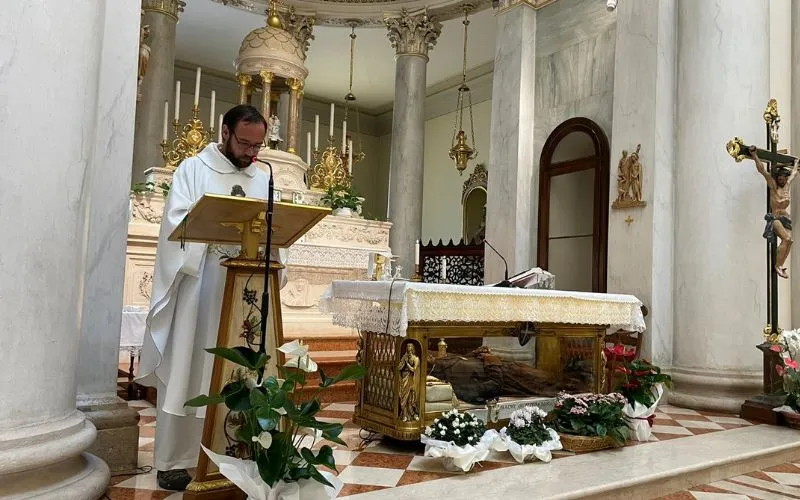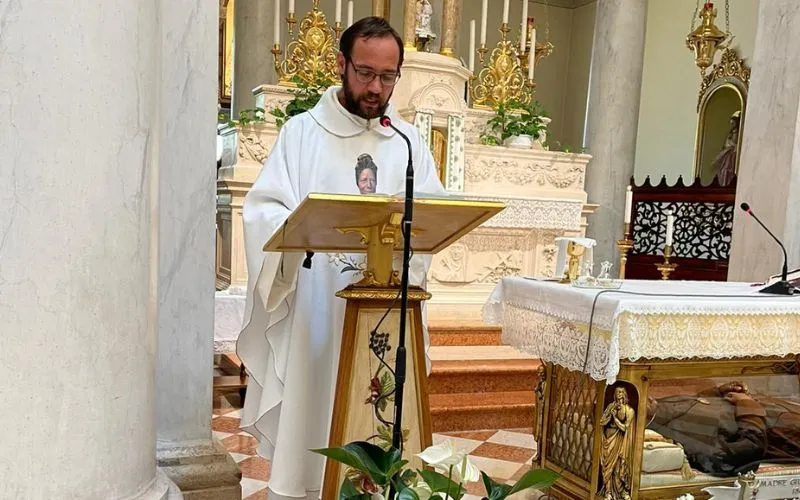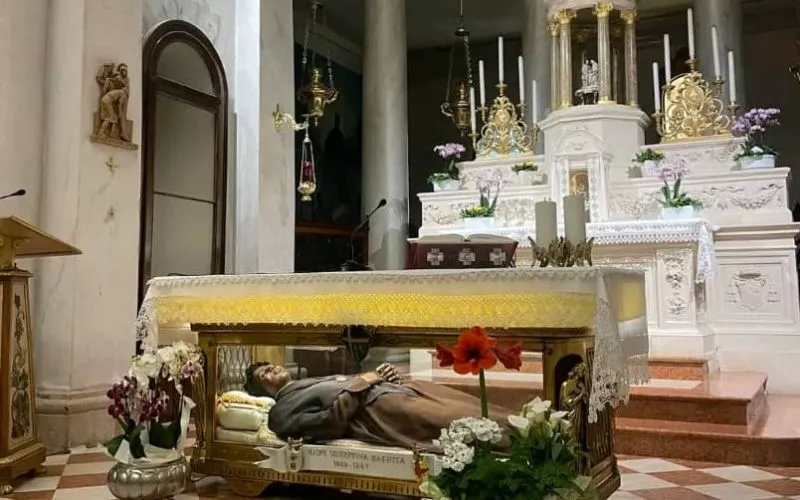 Credit: Courtesy/Sandro Pozza
Credit: Courtesy/Sandro Pozza
“I heard about her from eyewitnesses. Our elders had a great impression of her kindness and compassion for all people who visited the convent of the Canossian Sisters. Many children were coming daily to attend classes in the school run by the sisters,” the Italian-born member of the Comboni Missionaries of the Heart of Jesus (MCCJ) recalls.
Bishop Carlassare continues, “Sr. Bakhita liked to entrained children at their arrival. She was never given the chance to be a teacher in the class; but she knew every single child and was close to their families in their struggles.”
In the reflection, the Catholic Bishop who started his Priestly ministry in South Sudan (then Sudan) in the Catholic Diocese of Malakal in 2005 recalls St. Josephine Bakhita “as a companions and protector in mission because I was sent to be a missionary in the Sudan, her own land and people.”
“I am sure she is interceding with the Father for my fidelity in service and generosity in self-giving without any doubt or fear,” the Bishop, whose Episcoapl Consecration that was initially scheduled for Pentecost Sunday 2021, was indefinitely postponed following the 26 April 2021 incident when he was shot in both legs.
(Story continues below)
 Credit: Courtesy/Sandro Pozza
Credit: Courtesy/Sandro Pozza
Bishop Carlassare recalls that “in her old age, Sister Josephine's health began to decline, but she bore her sufferings with great fortitude. Many people streamed to see her and hear her words of encouragement.”
“She died in 1947 at the age of 78. Pope John Paul II beatified her on May 17, 1992, referring to her as universal sister. And he canonized her as a saint on October 1, 2000,” the Catholic Bishop further recalls in his reflection shared with ACI Africa on February 7.
“I take the opportunity to share three personal thoughts about her person. Firstly, I have always wondered about her name and identity. She was stolen from her family, and we don’t know her real name. She either forgot it or hid it,” he continues, alluding to the fact that the fright and the terrible experiences Bakhita went through made her forget the name her parents gave her.
Bishop Carlassare continues, “This was a terrible act of violence perpetuated to a young child: the kidnappers took away her identity for a new one, Bakhita. What can a person claim when he/she has been denied his/her identity? He/She can only be enslaved to those who control his/her life. It must have been a very painful experience.”
That was not all, the Catholic Bishop says, adding that Bakhita “was also tortured torture with the one hundred and fourteen scars inflicted on her body.”
“This experience of slavery worked in her by maturing an entirely unexpected personal path,” he further says, and recalls, “St. Bakhita herself reported to the sisters, ‘As a slave I never despaired because I felt a mysterious force sustaining me... I do not remember ever rebelling even when they made me suffer unjustly.’”
 Credit: Courtesy/Sandro Pozza
Credit: Courtesy/Sandro Pozza
Bishop Carlassare, who, while recovering from the attack on his life, offered his pain for the purification of Rumbek Diocese, where he had been appointed shepherd looks on Bakhita for inspiration, and poses, “What is the secret of St. Bakhita? What is the secret to such a reversal of every usual human dynamic?”
“We know how easy it is to react with anger, fear and despair when we are wounded in our dignity. Frequently the wounded person wounds in turn in a futile attempt to get justice. The oppressed person becomes easily an even crueler oppressor. This is because an oppressed person learns from the oppressor to be like him,” he says.
In the person of St. Bakhita, Bishop Carlassare says, “we see the fulfilment of God’s plan in her.”
The Catholic Bishop, who held a private meeting with Pope Francis ahead of his 25 March 2022 Episcopal Ordination goes on to recall the Holy Father’s sharing during his general audience on 11 October 2023 as, he says, “well expressed” in St. Bakhita. The Holy Father said, “The vocation of the oppressed is that of freeing themselves and their oppressors, becoming restorers of humanity. Only in the weakness of the oppressed can the force of God’s love, which frees both, be revealed”.
Another “personal” thought Bishop Carlassare shares about St. Bakhita is the symbolism of the crucifix.
Referring to St. Bakhita, he says, “I have always wondered about the meaning of the crucifix for her as she was born in a traditional African environment and brought up in the Islamic context (with) little understanding of the value of the cross of Christ.”
 Credit: Courtesy/Sandro Pozza
Credit: Courtesy/Sandro Pozza
Bishop Carlassare goes on to recall that Bakhita was once gifted “a small crucifix by her guardian, Mr. Illuminato Cecchini” and that having “never owned anything, kept it (jealously) as a treasure. Looking at it she experienced a profound inner liberation because she felt loved and thus able to love in turn.”
Bakhita would then reveal, “God's love has always accompanied me in a mysterious way... the Lord has loved me so much: one must love everyone... One must have compassion!", Bishop Carlassare further recalls.
According to Bishop Carlassare, “St. Bakhita was transformed by the words of Christ on the cross: ‘Father, forgive them for they know not what they do.’ She sensed that ‘if Judas had asked Jesus for forgiveness, he too would have found mercy.’” Pope Francis said that “the life of St. Bakhita became an existential parable of forgiveness”.
He continues, “In fact, St. Bakhita used to say: ‘Poor people! They – the kidnappers – did not know they were hurting me so much: they were the masters and I was their slave... As we are used to doing good, so the slavers did this because it was their habit, not out of wickedness... If I met those slavers who kidnapped me, and also those who tortured me, I would kneel down and kiss their hands, because, if this had not happened, I would not be a Christian now.’”
“Forgiveness set her free. She first welcomed the forgiveness of God and his merciful love. Then she was able to forgive, and forgiveness made her a free, joyful and loving woman,” Bishop Carlassare says about St. Josephine Bakhita.
 Credit: Courtesy/Sandro Pozza
Credit: Courtesy/Sandro Pozza
The Catholic Church leader, who envisioned the revival of the trauma healing center that provided psychosocial assistance to pastoral agents including members of the Clergy and women and men Religious in South Sudan says that forgiveness allowed St. Bakhita “to live far from her native land and loved ones, to be reborn every day where the Lord had called her together with new brothers and sisters. She certainly exercised patience and forgiveness toward those who treated her awkwardly as a less human person.”
Recalling the one time lamentation of St. Bakhita that “everyone looks at me as if I were a rare beast!”, Bishop Carlassare says, “Forgiveness disarmed her and helped her to let herself be loved by the local people of Schio as much as they were able to. Then, forgiveness enabled her to love in turn with the simplicity and concreteness of a smile, a caress, a gesture of charity. Forgiveness made her experience service not as slavery, but as an expression of the free gift of self.”
The third “personal” thought, which Bishop Carlassare shares about St. Bakhita is “her vocation to serve”.
He says about St. Bakhita, “Once free from slavery, she freely chose to become a servant, to carry on her shoulders the burdens of others. And she did it as a Sister in the Congregation of the Canossian Daughters of Charity.”
“At that time, (Canossian) Sisters were all Italian. Where did she find the courage to apply to be one of them? I like to think about her visit to one of the churches in Venice where there is an image of a black Mary,” Bishop Carlassare reflects.
He continues, “God does not look at our physical appearance, but looks deep into our hearts. We are all his children. No matter where we come from, to which social class we belong or so. Every human person is precious in the eyes of God. Each person has a vocation and mission. So, in this sense, her life is truly a miracle of God.”
For Bishop Carlassare, “St. Bakhita, by her example, shows us the way to finally be free from what enslaves us, our bondages and fears. She helps us to unmask our hypocrisies and selfishness, to overcome resentments and conflicts.”
 Credit: Courtesy/Sandro Pozza
Credit: Courtesy/Sandro Pozza
St. Bakhita, the Local Ordinary of Rumbek Diocese says, “encourages us to reconcile with ourselves and find peace in our families and communities. She offers us a gleam of light and hope to overcome division and mistrust in our communities and promote unity and peace.”
A statue of St. Bakhita is to be placed in St. Peter’s Square at the Vatican. The bronze sculpture, a piece by Catholic artist Timothy P. Schmalz, is dedicated to trafficking victims and to all women, especially the women Religious, who work to free women from modern day slavery.
The artwork depicts St. Bakhita freeing a mass of people from underground. It was set to arrive at the Vatican ahead of the International Day of Prayer and Awareness Against Human Trafficking on February 8.
ACI Africa was founded in 2019. We provide free, up-to-the-minute news affecting the Catholic Church in Africa, giving particular emphasis to the words of the Holy Father and happenings of the Holy See, to any person with access to the internet. ACI Africa is proud to offer free access to its news items to Catholic dioceses, parishes, and websites, in order to increase awareness of the activities of the universal Church and to foster a sense of Catholic thought and culture in the life of every Catholic.
 Bishop Christian Carlassare of the Catholic Diocese of Rumbek in South Sudan. Credit: Courtesy/Sandro Pozza
Bishop Christian Carlassare of the Catholic Diocese of Rumbek in South Sudan. Credit: Courtesy/Sandro Pozza



 Credit: Courtesy/Sandro Pozza
Credit: Courtesy/Sandro Pozza
 Credit: Courtesy/Sandro Pozza
Credit: Courtesy/Sandro Pozza Credit: Courtesy/Sandro Pozza
Credit: Courtesy/Sandro Pozza Credit: Courtesy/Sandro Pozza
Credit: Courtesy/Sandro Pozza Credit: Courtesy/Sandro Pozza
Credit: Courtesy/Sandro Pozza Credit: Courtesy/Sandro Pozza
Credit: Courtesy/Sandro Pozza Credit: Courtesy/Sandro Pozza
Credit: Courtesy/Sandro Pozza


